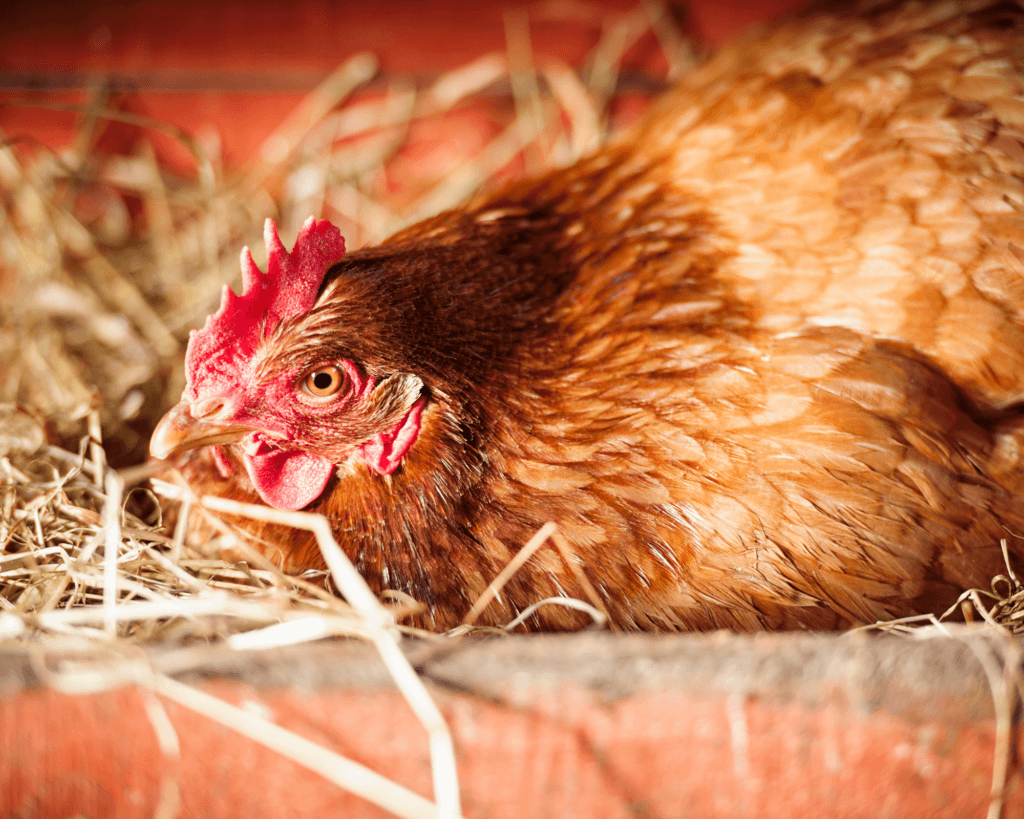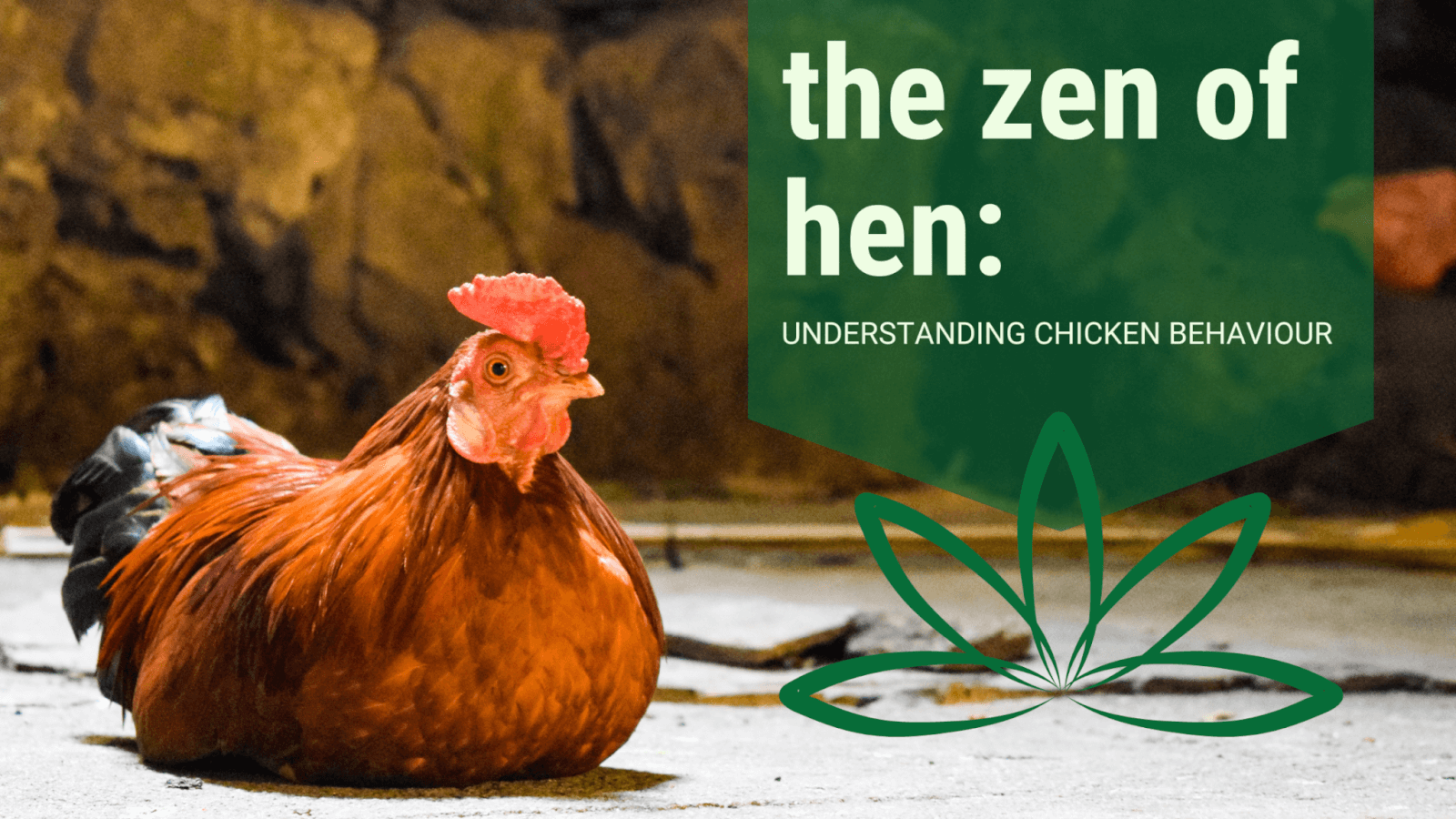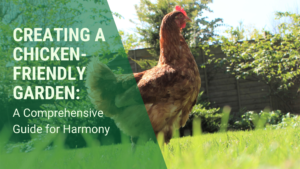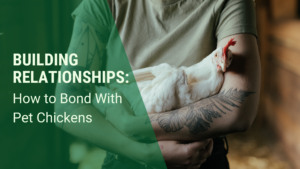Ah, the ever-entertaining world of chicken behaviour! As our flappy, feathery friends, chickens never cease to amaze us with their unique quirks and adorable antics. But let’s face it: their ways can be mystifying and sometimes downright baffling. To become an enlightened chicken keeper, you must embark on a journey to understand the mind of the hen. You must become one with the hen. You must become the hen. No, we aren’t suggesting you don a feather-adorned get-up and start clucking. We’re suggesting you get inside your hen’s mind. And read this blog.
So let’s explore the fascinating realm of chicken behaviour together. We’ve got all you need to guide you on your path to hen harmony.
Chicken Language: What Are They Saying?
First things first, let’s talk chicken talk. Chickens communicate in a plethora of ways, from clucks and purrs to squawks and crows. Recognising these sounds can aid you in addressing each bird’s needs, making their lives splendid and full of joy.
1. Contentment: Gentle murmurs or purring sounds indicate content hens happily going about their day.
2. Distress: Shrill shrieking, panicked swawks and urgent calls are signs of an alarmed or frightened chicken. React promptly to keep your flock safe and stress-free.

3. Egg song: Hens often make a unique clucking sound while preparing to lay an egg, announcing their feat to the world triumphantly. And why not? They’ll also often cackle afterwards in celebration. Or perhaps relief. We wouldn’t be thrilled about giving birth most days of the week either!
4. Food alert!: A fast, repetitive “buk-buk-buk” communicates the joy of discovering a tasty treat to the rest of the flock. And usually results in every hen in the vicinity rushing over to get in on the action.
5. Chicken Chat: These sounds vary across different hens and breeds, but clucking and bocking are usually part of everyday coop chatter and how chickens communicate with each other – the chicken equivalent of small talk.
6. Love language: Cockerels tend to make their intentions well known to their lady loves when they’re up for some action. They typically make low, deep rumbly sounds when they’re ready to mate – and they often dance too! Known as ‘tidbitting; they circle the hens while flicking their wings on the ground. Irresistible.
Mastering the art of chicken chatter will allow you to perceive what your hens need, soothing their worries and ensuring their well-being.
Hen Behaviour: The Good, The Bad, & The Ugly
Let’s move on to the different aspects of hen behaviour you should understand to become a mindful poultry guardian.
The Good
These behaviours indicate healthy, joyful chickens thriving under your watchful eye:
- Foraging: Hens love pecking around, searching for tasty morsels. Our live Black Soldier Fly larvae are perfect for encouraging foraging activity – and are brilliant for flock bonding and harmony too!
- Dust-bathing: Witness an impromptu ‘chicken spa day’ as hens roll in the dust to keep their feathers clean and combat pesky parasites.

- Exploring: A happy chicken is a busy chicken! When they aren’t bobbing around exploring their surroundings, they’ll often sit on the highest perch of their coop, surveying their domain with a keen eye for danger.
- Laying: During their laying phase, hens will lay anywhere from 100 to 300 eggs a year. It’s important to note that the laying cycle can vary, depending on breed and age. Hens will begin laying eggs around 10 months old and generally lay until they are 2-3 years old.
- Parenting: There’s a reason “mother hen” is a term used to describe people who take care of others. Chickens are highly maternal and will take good care of their young. They’ll protect them from predators, and give warmth, food and water – all the essentials needed to keep their chicks safe and healthy.

- Socialising: Chickens are a very social species and thrive when they have the opportunity to interact with one another. They enjoy being around other chickens and will form strong bonds with their flock mates, hanging out together, snuggling up at night and playing during the day. Some people believe that chickens are more intelligent than dogs, and they can recognise up to 30 other individual chickens!
- Preening: Hens meticulously groom themselves to maintain their splendiferous feather coats (so chic!). But, they shouldn’t spend too much time on this activity – less is more, after all.

- Mating: Birds do it, bees do it… We had it covered with the first example. Cockerels will start courting hens as soon as they are old enough, often following them around, strutting their stuff to impress them and displaying other behaviours that will eventually lead to mating. They make excellent husbands though – picking out the best nesting spots, finding the best treats and making sure their ladies are happy and safe.
- Resting: If you’ve ever watched a chicken, you’ll know that they spend a lot of time resting. It’s not just because they’re lazy; it’s actually important for their health. They need to rest after eating so their digestive system can get to work.

- Sleeping: Chickens typically rely on sunlight for their sleeping patterns and follow the sun, which means that in winter months when the nights are longer, they might sleep for a more extended period. Conversely, during the summer, when there is more daylight, they might sleep less.
The Bad
It’s essential to be aware of warning signs that may indicate issues with health, stress, or bullying within your flock:
- Feather-pecking: Excessive pecking among hens can point to stress or boredom and lead to injury. Ensure a high-quality living environment brimming with entertainment and use an anti-pecking spray, like the one from Nettex.
- Excessive Preening: As we said above, preening is good. But too much preening is a sign of stress and boredom and can result in feather loss.
- Aggression: If a chicken becomes particularly aggressive towards other chickens, humans, or even other species, it could be a sign of a problem, such as frustration, hunger, or stress. Aggression usually involves pecking, chasing, or fighting with others in the flock.

- Excessive Crowing: While it’s normal for cockerels to crow throughout the day, non-stop crowing could be a sign of disturbance or insecurity.
- Isolation: Chickens are social animals, so if a bird is frequently alone and not interacting with the rest of the flock, it might be ill or injured.
- Running Away or Hiding: If a chicken frequently runs away, even from known caregivers, or is constantly hiding, it indicates fear, stress, or discomfort.
- Swaying or head rocking: This is a common sign of stress, boredom, or illness. It can be caused by head trauma or a brain injury. It could also be a symptom of worms in the chicken’s digestive tract.
- Cannibalism: If a flockmate is injured, then the chances are they’ll be pecked at. Chickens are attracted to the sight and smell of blood. Isolate injured chickens immediately. Feather pecking can escalate to cannibalism if blood is drawn, so deal with it promptly.
The Ugly (But Not Worrisome)
Fret not, dear chicken keeper! Sometimes, seemingly worrisome behaviours are simply natural aspects of a hen’s life:
- Moulting: Shedding feathers may appear alarming, but moulting is nothing to fret over. Offer your hens extra protein to support new feather growth, and they will be brandishing their fresh plumage in no time.
- Broodiness: Broody hens become quite dedicated to their unhatched eggs, or even a misidentified rock or two. Be patient and understanding, allowing nature to run its course. Broodiness can become a problem if hens refuse to leave their nest boxes, not even for food or water, leading to health issues. Only then is it time to intervene.

- Ranking: Chickens are very political. They rank each other based on social standing in the flock. This can look like excluding other chickens from feeding, but they will only be instructed to wait their turn. We have a whole blog dedicated to understanding the pecking order.
- Egg-hiding: Hens will often squirrel away their eggs in secret locations (probably so you can’t get your hands on them.)
- Egg-eating: When hens feast upon their own eggs, it’s time to take action! Review their diet, ensuring they receive the proper nutrients and calcium.
- Digging Holes: Chickens are excellent diggers, and they love to create holes while searching for bugs and seeds. As long as they’ve got a secure place to do so, this isn’t a behaviour to worry about.
Join our flock
Now you’re an honourary chicken, you’ll need a flock to be welcomed into! We’re here for you. Join our mailing list to get exclusive content, offers and be the first to hear about our newest blogs and guides.




